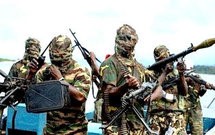 According to Oct. 17 statements released by Nigerian government and military officials, Nigeria has reached a cease-fire deal with Islamist rebel group Boko Haram -- one that includes the release of more than 200 female students kidnapped in April. This claim, however, should be met with caution. It is not the first time that the government has reported a truce with the militants.
According to Oct. 17 statements released by Nigerian government and military officials, Nigeria has reached a cease-fire deal with Islamist rebel group Boko Haram -- one that includes the release of more than 200 female students kidnapped in April. This claim, however, should be met with caution. It is not the first time that the government has reported a truce with the militants.
Although the government may have in fact finalized a deal with particular leaders, Boko Haram is a deeply fractured movement. Any concessions the government may have made -- which could include ransom payments or even prisoner swaps -- will not put an end to the organization. A single agreement cannot erase the regional divide between Boko Haram's home territory in northern Nigeria and the nation's southern core. Even if agreed upon, the release of every kidnapped student may well be impossible: Boko Haram leaders would have to gather the girls after likely having divided them between local groups. Some may even have been taken outside of Nigeria and into the broader Sahel region. Despite these obstacles, Nigerian President Goodluck Jonathan and his supporters will present this as a political victory, using it to enhance his position ahead of February 2015 elections.
It is quite possible that Abuja has reached an agreement with a legitimate representative of a specific cell or faction within Boko Haram that is holding the kidnapped girls. It is much less likely, however, that this willingness to make a deal extends to all elements of Boko Haram. Boko Haram is a decentralized movement that operates in Nigeria's poor northern region, an area that will continue to be a hotbed of discontent as long as it does not benefit from Nigeria's resource wealth. The country's military has faced significant challenges in fighting Boko Haram recently because the militants have managed to take control of villages across a relatively large swath of northeastern Nigeria. A pause in the fighting would enable Abuja's military officials to restore morale among soldiers, shift resources and deliver much-needed supplies.
In the end, a sustainable peace agreement between the Nigerian government and Boko Haram is unrealistic. Boko Haram would not have negotiated the reported truce from a position of weakness. Despite recent limited government gains, Abuja has been unable to turn the conflict completely against Boko Haram and the militant group retains control of a number of northeastern towns. Boko Haram will therefore continue to be a problem, and whoever wins the Nigerian presidency in February will be challenged with containing and combating the Islamic group.
Courtesy : Stratfor (www.stratfor.com)